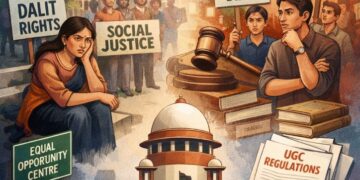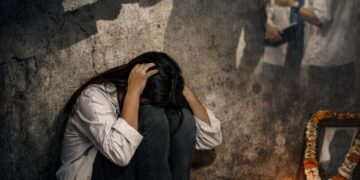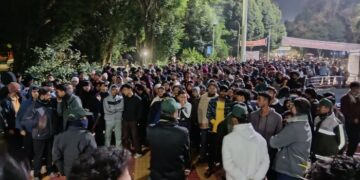As India battles a calamitous covid19 surge, children, who anyway are the greatest victims of this pandemic by not only losing school space but outdoor life as well, aren’t cared by the government. After an absent Children Day last year (in 2020), the 11th anniversary of Right of Children to Free and Compulsory Education Act, 2009, on April 1 this year also went unmarked.
In any case, this landmark legislation that fructified after a long struggle of over 100 years is in an endangered zone since the NDA-2 government came to power at the centre, which as it appears, is keen on making it toothless if seen by its acts of its providing emphasis on ‘outcomes’ by way of Central RTE Rules amendment to include reference on learning outcomes in March 2017 and not inputs to doing away with no detention policy (section 16) through RTE Amendment bill 2019 and finally by replacing ‘right’ with ‘universal access’ in the much hyped NEP 2020.
For record, NEP 2020 announced amidst pandemic without a debate in the Parliament, also lays emphasis on ‘alternative models of education’, through ‘multiple pathways’ which also include non-formal and open schooling and minimally trained volunteers, community members and also child-tutors from the same school for children of grades one and two of primary schools. It also brought examination scheme back in grades 3, 5 and 8 in addition to the board examinations in grades 10 and 12 that runs contrary to the RTE.
The Government, which has long ago given up publishing annual status reports on RTE Act implementation status, conveniently sidelined the ‘compulsory’ obligation on it under the Act after the onset of the current pandemic in March-April 2020. According to estimates, more than 143 million primary school children and more than 133 million secondary school children in India are affected by school closures due to the pandemic. With about 65% of children in the country enrolled in government schools, an overwhelming majority lost one full academic year. Barring a minority of high end private schools, the story would be same for the bulk of private school children.
The rights-based framework under section 3 of the RTE Act states that “free education” implies that no children – other than a child who has been admitted to a school that is not supported by the government – shall be liable to pay any kind of fees or charges or expenses that may prevent them from pursuing and completing elementary education. With a national average of Internet access to less than 25% and a large proportion of them on single device, the shift to online education necessitated by the pandemic, obviously didn’t reach most children. Understandably, millions of children spent on buying devices and paying for internet. Doesn’t it violate the right?
Activists and supporters of RTE in this backdrop are naturally agitated and there is a feeling that this government is working some agenda to reduce the RTE Act to just a lip service. According to Prof Muchkund Dubey, President, Council for Social Development and a former foreign secretary who actively supports the right to education, a serious commitment to Right to Education may have ensured a lot of thinking and remedial measures in the time of school closures but when you are not recognizing a framework, how will solutions come through it. Long closure of schools also means end of gains in ending inequality, exclusion and social justice. “The very idea of a school as an imagination for social integration has collapsed,’ feels S. Srinivasa Rao, Associate Professor of Sociology of Education at Zakir Husain Centre for Educational Studies, Jawaharlal Nehru University (JNU). “While drop outing was already a big challenge, the pandemic forced shutdown has larger implications for a vast population of first/second generation school goers. Malnutrition (because midday meals now not there), early marriages, child labor—all can take us back by decades and what will be its final picture nobody can tell at this stage,” he says.
Lack of planning may one a factor in fanning the sentiment against the Government. Prof R Govinda, noted educationist and former NUEPA vice-chancellor, feels planning has lost its course in school education and there is an urgent need of state level action plans to arrest the decline of proper implementation of the Act. He also pointed out lack of enthusiasm among states as another serious factor that has impacted school education. “There was a thought that RTE should be rolled out as a program and not as a scheme. But then SSA became the primary vehicle of its implementation. So states thought that both the Act as well as planning was of the centre, so at a thought level they just stopped owning them,” he said.
While the RTE Act implementation progressed just over 1% in its first decade (12.7% as per RTE Forum status report 2019), the anniversary or a status report would have provided an opportunity to deliberate on the bottlenecks and practical difficulties and even a debate on any necessary changes. But it seems that it is not only the strong lobby of schools that market themselves based on the exam scores of their students, who glee on absence of Ministry of Education’s omissions, but it appears to be part of a deliberate ideological strategy.
There has been a growing demand for ending exemptions to minority education institutions, which have undoubtedly grown after they were left out of the purview of the Act. On the other side over 1 lakh Eklavya Vidyalayas run by Ekal Vidyalaya Foundation are built as a movement by RSS-this affiliate and need to be patronized by the BJP government. Both these actually reduce the effectiveness of the Act.
To sum up, only a thorough review of RTE Act and consultations can sort out matters. The Government can best utilize the pandemic situation to bring transparency and purpose to its own agenda and own up this legislation, which in the long run will benefit this nation.











